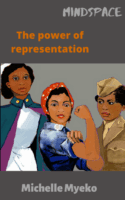My mother was born in 1939, at the beginning of the Second World War. By the time she was eight, two of her older sisters had already been married off. The one being a 16-year-old bride, while the oldest’s marriage was slightly delayed because she was 18 when she got married. For her two older sisters in this marginalized society, marriage was the natural progression in life. First, there was childhood, which was relatively carefree but very short, followed by early teens which was when little girls would be introduced to chores in preparation for marriage.
My two older aunts went to school in early childhood, having no dreams of having a tertiary education. They were taught by mostly male teachers but by the time my mother started primary school, the first female primary school teacher was employed by the village school. This was a first; my mother had never seen a female teacher before. In telling this story, my mom remembers how the teacher wore high-heeled shoes with a mint-green two-piece. This teacher was the most glamorous woman my mother had ever set her eyes on. She immediately wanted to be her. She became a devotee to her teacher.
When, at 14, a local young man who had been working in the mines in Johannesburg was looking for a wife, he chose my mother. He contacted my grandparents and it was decided by both families that cows would be exchanged for my mother’s hand in marriage. This was despite the fact that the young man had never had a full conversation with my mother. He wanted her for a wife because he was of age and the acquisition of a wife was a natural progression of manhood – there was no romance. My mother was horrified by the idea. She ran away because to her the idea of early marriage held no appeal. She had seen it and wanted no part in it. She wanted what her teacher had represented. She wanted a career in education. To cut a long a story short, at 60 years of age my mom retired from 38 years of teaching. Her dream came to fruition after much convincing of her parents to return the cows then to keep and educate her, an act which was revolutionary at the time.
Miss Mdingi, my mom’s teacher, was the first example of the power of representation that my mother experienced. In Miss Mdingi, my mom saw an alternate universe where women used their minds to earn a living and were not reliant on the earnings of husbands.
In 2020, representation is still sorely lacking while being crucially important. In media, people such as myself are not represented. I am a middle-aged, queer, mother of four and can only count on one hand the number of times I have seen people such as myself represented. Having your lived experience invisible in the world, makes you question your choices. You start seeing yourself as an aberration from the norm. I remember how obsessed I was with a television series called Society. For the first time I saw a black, South African, queer woman who was feminine-presenting being a lead on a TV show. Her name was Beth and for every time I have come out to people, Beth has acted as a cultural reference. When people ask me how I can be gay if I like skirts and I’m feminine, I tell them I am this way in the same way that Beth was queer also while retaining all of her femininity.
Representation is important to every single person in society. We need to see ourselves reflected in the culture and the societies in which we exist. There are many female teachers in 2020 because throughout the decades, children would spend hour upon hour in the company of teachers so the dream of teaching became a highly plausible and therefore achievable goal. What we need to do though is diversify the dream; we need to show female engineers, queer religious leaders, black astronauts and plus-sized models so that each child who fits into any of the above labels can see themselves and therefore aspire to whatever dream, big or small. Representation acts as a mirror to society and mirrors need to accurately reflect all members of the population.
Young people in society need to dream bigger than just being teachers, nurses and rappers. They need to understand that there are mathematicians in our midst such as the Vice-Chancellor of UCT Mamokgethi Phakeng, so that little girls who are good with numbers can have the highest dream.
Read about one writer’s experience with body-shaming here
Tell us: Do you think there is enough diversity in who is represented in the media today?



